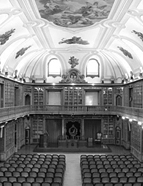

With the advent of a new power in 1926, «the law of the nation» became increasingly identified with «the law of the state», while the pursuit to «reveal the soul of the nation» was conducted through history (A. M. Hespanha, «Historiografia jurídica [Legal historiography] », Análise Social, 18 (72-74), 1982, pp. 800 and 804), a common approach among some literary trends, which led to a search for the past in bygone eras. History «as the evolution of law and institutions helped to present an inter-classicist ideal of nation, in which the forums, courts, municipal ordinances, etc., were adequately included", as taught at Madrid's Centre of Historical Studies (Mártinez Millán, «La historiografía sobre el siglo XVI español», in José António Munita Loinaz, ed., XXV años de historiografía hispana (1980-2004), 2007, p. 111), where T. Soares had studied in 1934. The Middle Ages predominated in the pages of the afore-mentioned História de Portugal, just as the historiography produced and taught in the 4th Cluster of History until the April Revolution was mainly medieval, as shown by the collaboration in the RPH from 1941 to 1974, and as was the case with the contents of other journals outside Coimbra. In fact, this practice had been handed down from the monarchy, as may be understood in the restructuring of the Curso Superior de Letras in 1901.
The absence of the Contemporary Age, which was also evident in other departments of the Faculty, despite its formal admission by the titles of the curricular units, as far as History, teaching and research beyond 1789 were concerned, was sometimes attempted in relation to general history. However, it should be noted that in view of the course load allocated to the subjects of Modern and Contemporary History and the History of Portugal within the scope of the various restructuring processes, it was not always possible to teach contemporary history in a system of intensive courses, as was then the practice. On the other hand, the lack of experts in this area, a shortage that was also felt in other countries, the internal opposition to the suppression of subjects or, conversely, the budgetary imbalance due to increased teaching hours, as well as the formal aspect of many documents only coming into the public domain one hundred years later, may have weighed more heavily than an eventual assumption of an ideologically devalued 19th century - although in politics there is always more than one meaning to take into consideration. However, the battles waged nowadays for contemporary history have also been mirrored in the defence of modern history against the prevalence of medievalism. In fact, in around 1933, J. de Carvalho praised the example of Damião Peres for extending his research activity beyond the Middle Ages.
